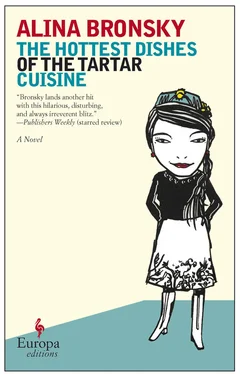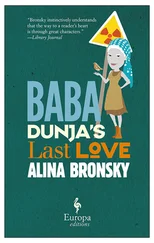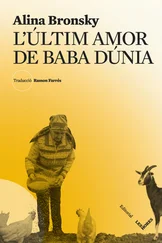“Okay, okay. What’s its name?” Klavdia asked.
“Aminat,” I said. “Her name is Aminat.”
“What?” said Klavdia, who had always insisted on calling my daughter, whom she’d known since she was a baby, Sonja, and me Rosa, which was at least derived from my actual name, Rosalinda. We had beautiful names that nobody else seemed to be able to deal with.
“That is, Anna, Anja,” my husband corrected. He always wanted to be like everyone else.
“Aminat,” I repeated. I didn’t think it was so difficult to remember. My granddaughter would be called Aminat, just like my grandmother, who’d grown up in the mountains. Even if I turned out to be the only one, I would always call her by her real name, and who cared that in daycare, kindergarten, school, university, and then in whatever profession she entered she would soon become just another Anja. For me she would be Aminat, and I immediately began to pray that someday she’d be able to live a life where people didn’t automatically butcher her name.
“Her name is Aminat Kalganova,” I said, and Klavdia’s disapproving face disappeared from the doorway.
My husband put his hands over his ears and said, “That really is unbearable. Is she going to keep that up?”
My daughter Sulfia awoke from her trance and said, “I’m so hungry, mother.”
The baby girl I named Aminat, after my grandmother who had been born in the Caucuses, turned my life upside-down. Everything changed. Sulfia took the birth of her daughter as an opportunity to sleep nonstop. And she ate nonstop, as well. She liked to hold the baby, — she spoiled her that way, in fact — but she was otherwise good for nothing. She even proved useless whenever the new baby was hungry. During the night, Sulfia slept so soundly that she didn’t hear the miserable yelps of loneliness or the irate screams of hunger.
I lay on the other side of the wall and listened to the baby girl cry. I knew exactly what she needed. After the first three days I could distinguish the sounds. Eventually I couldn’t take it any longer and brought the crib into the room I occupied with Kalganow.
I liked the way she balled her tiny fists and rubbed her eyes when she was sleepy.
Mornings I sent Kalganow to the milk dispensary for baby formula — after all, someone had to make sure the baby got enough to eat. She drained every bottle in the shortest time, much more quickly than other children. My husband tried to protest when I asked him to go; the line of unshaven young fathers at the milk dispensary made him uncomfortable. But I determinedly sent him every morning. This was about his own flesh and blood. Kalganow said he wouldn’t treat his own granddaughter any better or worse than he would any other child because all mankind were of equal worth. I called him a fascist.
After a few months, Sulfia returned to her nursing program and I registered little Aminat for daycare. We all had to get on with our lives somehow. Aminat cried bitterly. I had to pry her fingers from my skirt every morning when I left.
My granddaughter Aminat was lucky. She hadn’t inherited any of the sluggishness or ugliness of her mother. She had my dark, almond-shaped eyes, my gently wavy black hair, a slender nose, and a bright look on her face. With some people, you can tell from the moment of birth whether they’re smart or not. I had been able to tell with Sulfia — and had been proved correct. Maybe it had something to do with the fact that Sulfia had been conceived in bed, with my husband, rather than by a stranger in a dream.
Aminat was nonetheless a troublesome child. She didn’t want to go to daycare. She would start to scream as soon as we got there and I had to swat away the fingers she clawed into me. But I couldn’t keep showing up late for work.
When I went to pick her up each evening, I could hear her screaming from the street. I felt embarrassed. I didn’t like the fact that my granddaughter was disturbing the whole school. In fact, I felt I had to explain to the caregiver that Tartar children are usually well behaved. For the most part better than Russian children, though of course I didn’t say that. I didn’t want to sound arrogant.
Aminat fought all efforts at child rearing. I even caught myself referring to her as Anja in front of the kindergarten teachers because I was so ashamed of her. She was such a handful that I didn’t want to make things any more difficult for the teachers by also insisting on using an Arabic name. I could be so thoughtful at times.
My daughter Sulfia meanwhile forgot she had given birth to a daughter. She finished her vocational training and began working at a surgical clinic. But she hadn’t passed her exams, so she had to work as a nursing assistant instead of as a nurse. She performed the lowliest duties and nothing of importance. Still, I thought it was for the best for everyone.
I was just happy that despite her limited capabilities, my daughter had become a productive member of society and had even given birth to a daughter of her own, and a surprisingly fabulous one at that. Sulfia was out of the woods, leaving me time to see to raising my granddaughter. It was an important duty for a woman like me, and not such an easy one with a child like Aminat.
Very slowly I stopped paying attention to Sulfia. I no longer noticed when she came home or what she did when she was home. As a result, I was totally unprepared when I came home one day and found a note on the windowsill: Dear Mama, dear Papa, I’m moving out and taking Anna with me. Please just leave me alone. Kisses, your Sulfia.
Next to the note was the key to her room.
My heart beat loudly against my ribs as I threw open the wardrobe she and I shared and found it half empty. Sulfia’s neatly hung dresses and skirts were gone, her underwear was gone, her pantyhose were gone. Some much more important things were gone, too: Aminat’s rompers, socks, and sweaters, as well as her stuffed animals and bottles, her cloth diapers, and her favorite cup, the one with the yellow rabbit on it.
I didn’t give myself much time to wallow in depression. I took action, as was always my way. I opened the tin can where we kept the petty cash and took out a few banknotes. I hurriedly threw on my coat and ran out to the street. I stood on the curb and put out my thumb. Not nervously fidgeting the way some people did it, but unambiguously, with dignity. That always worked.
A small, dirty car stopped immediately. I always looked younger than I was, and people were happy to be able to help a woman like me.
It was impossible to tell what color the Lada was beneath the filth, but the car got me to Aminat’s kindergarten within eight minutes. The driver wouldn’t take any money, and I didn’t insist. He was understandably proud to have had a woman like me in his car. But I was too late. Sulfia had already picked up Aminat from kindergarten. She had planned everything.
Aminat’s cubby in the entry hall was empty. Her indoor shoes and her smock were gone. The worm she had kneaded out of modeling clay during arts and crafts was gone as well. Aminat wasn’t coming back to this kindergarten anymore, said one of the teachers, with an unusually official look on her face. Aminat’s mother had moved to the other side of town and put her child in a kindergarten that was closer to her new residence.
“Where?” I shouted.
She was unable to be of further assistance, said the bespectacled hag, clearly taking pleasure in my distress.
I have to say I wasn’t just distraught. I was surprised. For ages I’d thought that Sulfia had about as much drive as a garden slug. The fact that she was able to undertake such a Nacht und Nebel — style operation, to snatch Aminat away, register Aminat at a new kindergarten, and — perhaps most shocking — find a new apartment for two, without a peep to me or her father, did not fit the image I had of Sulfia.
Читать дальше












